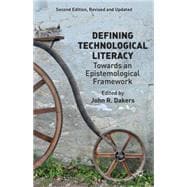In order to achieve a truly democratic world, any tensions or confusions between human beings, their environment, and their technologies must be resolved: the need is growing for everyone, particularly young people, to be more critically involved in the discourse surrounding technology. Only then will people become empowered to improve their world in a creative, sensitive, informed and above all, sustainable fashion. This collection provides a solid basis for defining technological literacy. Completely revised and updated in its second edition, it shows how philosophy, design, and pedagogy come together to shape our interactions with and understanding of the technology that mediates our everyday lives.








